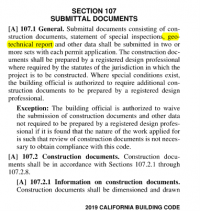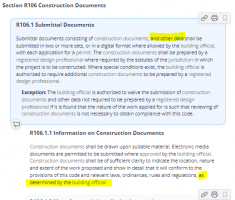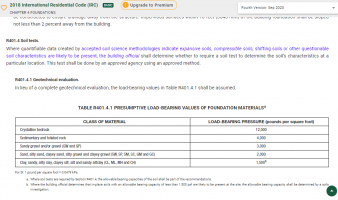I am still not hearing what is the legal basis for requiring a geotechnical report nor am I hearing what criteria will be used when "reviewing" geotechnical reports.
I have this quaint belief that building departments can only require that which they have the legal authority to require.
I can only speak to California.
I provided the link in post #8 for City of Los Angeles, and I believe that link shows where they have adopted into their Municipal code.
In California, for other than one- and two-family dwellings:

For one-and two family dwellings, in places other than Los Angeles, the language of the residential code allows for subjective determination on the part of the building official:

After, that California Residential code R401 gets much more specific about geotechnical reports:
R401.4 Soil Tests
Where quantifiable data created by accepted soil science methodologies indicate expansive
soils, compressible soils, shifting soils or other questionable soil characteristics are likely to be present, the
building official shall determine whether to require a soil test to determine the soil's characteristics at a particular location. This test shall be done by an
approved agency using an
approved method.
R401.4.1 Geotechnical Evaluation
In lieu of a complete geotechnical evaluation, the load-bearing values in Table R401.4.1 shall be assumed.
TABLE R401.4.1
PRESUMPTIVE LOAD-BEARING VALUES OF FOUNDATION MATERIALSa
| CLASS OF MATERIAL | LOAD-BEARING PRESSURE
(pounds per square foot) |
| Crystalline bedrock | 12,000 |
| Sedimentary and foliated rock | 4,000 |
| Sandy gravel and/or gravel (GW and GP) | 3,000 |
| Sand, silty sand, clayey sand, silty gravel and clayey gravel (SW, SP, SM, SC, GM and GC) | 2,000 |
| Clay, sandy, silty clay, clayey silt, silt and sandy siltclay (CL, ML, MH and CH) | 1,500b |
For SI: 1 pound per square foot = 0.0479 kPa.
- Where soil tests are required by Section R401.4, the allowable bearing capacities of the soil shall be part of the recommendations.
- Where the building official determines that in-place soils with an allowable bearing capacity of less than 1,500 psf are likely to be present at the site, the allowable bearing capacity shall be determined by a soils investigation.
R401.4.1.1 General and Where Required for Applications Listed in Section 1.8.2.1.1 Regulated by the Department of Housing and Community Development
Foundations and soils investigations shall be conducted in conformance with Health and Safety Code Sections 17953 through 17957 as summarized below.
R401.4.1.1.1 Preliminary Soil Report
Each city, county, or city and county shall enact an ordinance which requires a preliminary soil report, prepared by a civil engineer who is registered by the state. The report shall be based upon adequate test borings or excavations, of every subdivision, where a tentative and final map is required pursuant to Section 66426 of the Government Code.
The preliminary soil report may be waived if the building
department of the city, county or city and county, or other
enforcement agency charged with the administration and
enforcement of the provisions of
Section R401.4.1.1, shall determine that, due to the knowledge such
department has as to the soil qualities of the soil of the subdivision or lot, no preliminary analysis is necessary.
R401.4.1.1.2 Soil Investigation by Lot, Necessity, Preparation and Recommendations
If the preliminary soil report indicates the presence of critically
expansive soils or other soil problems which, if not corrected, would lead to structural defects, such ordinance shall require a soil investigation of each lot in the subdivision.
The soil investigation shall be prepared by a civil engineer who is registered in this state. It shall recommend corrective action which is likely to prevent structural damage to each
dwelling proposed to be constructed on the expansive soil.
R401.4.1.1.3 Approval, Building Permit Conditions, Appeal
The building
department of each city, county or city and county, or other
enforcement agency charged with the administration and
enforcement of the provisions of this code, shall approve the soil investigation if it determines that the recommended action is likely to prevent structural damage to each
dwelling to be constructed. As a condition to the building
permit, the ordinance shall require that the
approved recommended action be incorporated in the construction of each
dwelling. Appeal from such determination shall be to the
local appeals board.
R401.4.1.1.4 Liability
A city, county, or city and county or other
enforcement agency charged with the administration and
enforcement of the provisions of
Section R401.4.1.1, is not liable for any injury which arises out of any act or omission of the city, county or city and county, or other
enforcement agency, or a public employee or any other person under
Section R401.4.1.1.1,
R401.4.1.1.2 or
R401.4.1.1.3.
R401.4.1.1.5 Alternate Procedures
The governing body of any city, county, or city and county may enact an ordinance prescribing an alternate procedure which is equal to or more restrictive than the procedures specified in Sections
R401.4.1.1.1,
R401.4.1.1.2 and R401.1.1.3.
R401.4.2 Compressible or Shifting Soil
Instead of a complete geotechnical evaluation, where top or subsoils are compressible or shifting, they shall be removed to a depth and width sufficient to ensure stable moisture content in each active zone and shall not be used as fill or stabilized within each active zone by chemical, dewatering or presaturation.




